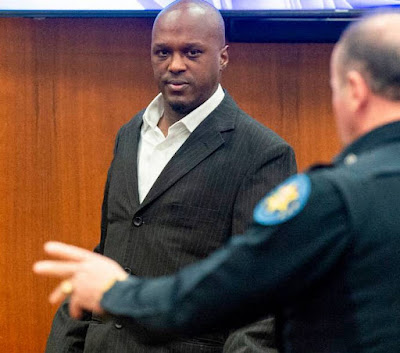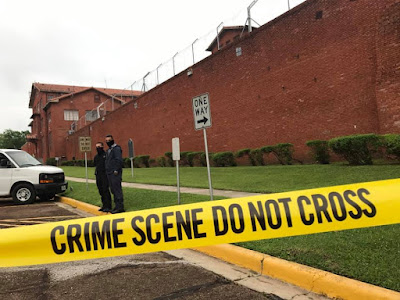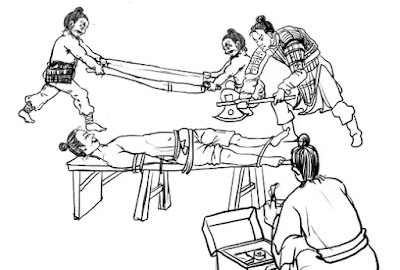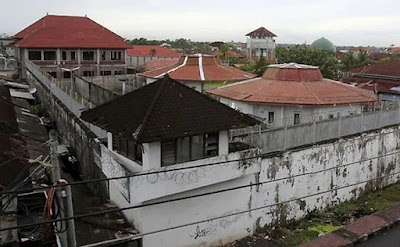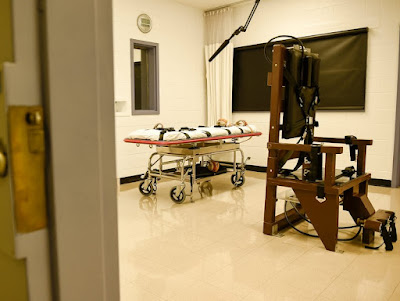40 years after the first execution of Gary Gilmore under contemporary laws, 18 anti-death penalty activists were arrested at the U.S. Supreme Court on Tuesday. The group unfurled a 30-foot-long banner that read "STOP EXECUTIONS!" on the steps of the Court.
On the sidewalk, a crowd of over 80 supporters observed the action, carrying 40 posters (1 for each year) with the names of the other 1442 men and women executed since 1977. They also carried roses in 2 colors, a reminder that they are remembering both families of the murdered and families of the executed as they stand together saying, as one banner did, "We Remember the Victims, But Not With More Killing."
The group included several murder victim family members, a death row exoneree, family members of the incarcerated, pastors and religious leaders, and national leaders in the death penalty abolition movement. It was the largest act of civil disobedience against the death penalty in modern history.
One of the participants who was arrested was Randy Gardner, whose brother, like Gilmore, was executed in Utah by firing squad.
"My Brother Ronnie Lee Gardner was executed in 2010 by the same state and by the same method as Gilmore," Gardner stated. "I believed then, and I still believe now, that the death penalty is morally wrong. I never condoned what my brother did, but when the state executes someone, they create yet another family that is damaged and grieving. We don't have to kill to be safe from dangerous criminals and hold them accountable. It is time to abolish the death penalty."
Shane Claiborne, influential Christian author and activist, speaking of the significance of religious leaders, said this: "Sadly, the death penalty has succeeded in America not in spite of Christians but because of us. Over 80% of executions in the past 40 years have been in the Bible Belt. As a Christian, that is especially troubling because one of the tenants of our faith is this: No one is beyond redemption. Much of the Bible was written by murderers who were given a second chance. Moses. David. Paul. The Bible would be much shorter without grace. So it was a beautiful thing to stand alongside my fellow clergy and faith leaders ... And, if you go to jail, it's good to have a nun and a priest next to you. As we look at history, we are reminded that we've got good company among the holy troublemakers who have gone to jail for justice. Abortion is not the only pro-life issue."
Claiborne continues: "When we try to kill those who kill, we mirror, and legitimize, the cycle of violence. We can deal with violent crime without resorting to the violence we want to rid the world of. As faith leaders and clergy, we stand together, with families of the murdered and families of the executed, and say NO to all killing. Violence is the disease, not the cure."
Scott Langley, a death penalty abolition organizer from New York, said "The national tide has turned against the death penalty with more and more states, counties, and juries refusing to continue this barbaric practice. We acted today to call on this Court to recognize that standards of decency and human rights have evolved to the point that this has to end now."
Those arrested were Peter Armstrong (Washington, DC), Leroy Barber (Portland, OR), Abraham J. Bonowitz (Columbus, OH), SueZann Bosler (Miami, FL), Shawn Casselberry (Chicago, IL), Shane Claiborne (Philadelphia, PA), John Dear (Santa Fe, NM), Randy Gardner (Taylorsville, UT), Lisa Sharon Harper (Washington, DC), Derrick Jamison (Cincinnati, OH), Art Laffin (Washington, DC), Scott Langley (Ghent, NY), Michael McBride (Oakland, CA), Tom Muther (Topeka, KS), Doug Pagitt (Minneapolis, MN), Jack Payden-Travers (Lynchburg, VA), Sam R. Sheppard (Oakland, CA), and Kelton Tupper (Cheverly, MD).
Background: 40 years ago, on January 17, 1977,
the State of Utah shot to death Gary Gilmore, who "volunteered" to be killed in revenge for his murder of Ben Bushnell and Max Jenson. This state-assisted suicide was the 1st execution under the Supreme Court's upholding of the death penalty in 1976. Since then, there have been 1442 more executions, with another scheduled on January 18 in Virginia. Nearly 3,000 prisoners are currently on death rows in 31 states.
The protest is organized by the Abolitionist Action Committee (AAC), an ad-hoc group of individuals committed to highly visible and effective public education for alternatives to the death penalty through nonviolent direct action. The AAC also organizes a 4 day fast and vigil on the Supreme Court sidewalk every June 29 through July 2, and all are invited to participate.
Organizations endorsing/supporting this action include
Abolitionist Action Committee
Campaign for Nonviolence
Catholic Mobilizing Network
Center for Action and Contemplation
Consistent Life Network
Embrey Human Rights Program
Evangelicals for Social Action
Faith in Public Life
Journey of Hope ... From Violence to Healing
National Council of Churches
OPEN
People of Faith Against the Death Penalty
PICO Network LIVE FREE Campaign
RAW Tools
Red Letter Christians
Repairers of the Breach
Sojourners
We Stand With Love
Witness to Innocence
DONATE to support the action and those arrested. Funds needed for transportation, housing, legal support, court costs, etc. Pledge $40, $400 or whatever you can afford at
www.SendASign.org.
Facebook:
http://www.facebook.com/fastandvigil
Twitter: @AbolitionAAC
Web:
http://www.abolition.org
Email:
ac@abolition.org
Mail: P.O. Box 89, Ghent New York 12075, USA
Source: Abolition Action Committee, January 17, 2017
Death penalty protesters arrested outside Supreme Court
Police arrested more than a dozen death penalty protesters outside the Supreme Court Tuesday.
The Abolitionist Action Committee organizes protesters to engage in civil disobedience every 5 years on Jan. 17, marking the date of the 1st execution after the Supreme Court allowed the death penalty to resume in 1977. This year is the 40th anniversary of Gary Gilmore's execution by firing squad in Utah. Gilmore, who shot and killed 2 people reportedly without a motive, volunteered for the death penalty.
The protesters' arrests outside the court come as the death penalty is resurfacing as a contentious issue at the Supreme Court. A split decision from the Supreme Court last month allowed the execution of an Alabama man to proceed after multiple stays. Justice Stephen Breyer, who favored granting a stay to block the Alabama man's execution, then delivered a public call for the high court to "reconsider the constitutionality of the death penalty" in a dissent from the court's inaction on a death penalty case from Florida.
The high court has heard oral arguments in a death penalty case this term in Moore v. Texas, in which the justices will look to answer whether the execution of an inmate after an elongated period of incarceration violates the Eighth Amendment's protection against cruel and unusual punishment.
Tuesday's arrests of anti-death penalty protesters also happened as the nation's capital braces for the arrival of thousands of protesters unhappy with President-elect Trump's looming inauguration. Protesters have made plans to disrupt the inauguration and spoil several inaugural balls beginning on Thursday.
Source: Washington Examiner, January 17, 2017
18 Arrested at Anti-Death Penalty Protest
On a wet January day - as the nation's capital preps for Inauguration Day and the Women's March on Washington - more than 80 anti-death penalty protesters sang, prayed, and chanted on the steps of the U.S Supreme Court. 18 were arrested for nonviolently proclaiming their beliefs.
The protestors held a large white banner with the words "Stop Executions" written on it as they stood on the highest steps on the Supreme Court building - forbidden to protestors.
Protestors on the lower steps held flowers and large red placards with the names of executed individuals on them.
"We are standing with families who have had their loved ones murdered and families who have had their loved ones executed or put on death row," said activist Shane Claiborne, who was arrested during the protest.
"Violence is a disease not the cure," he continued. "As families themselves say, remember our loved ones but not with more killing. That's our message today."
This protest brought together leaders from faith-based civil rights organizations including Sojourners, supporters of the cause, and people directly affected by the Supreme Court's death penalty decisions.
1st-time death penalty protestor Don McCraw of Baltimore said he remembers being conflicted about death penalty.
"I didn't really think at first that I had an opinion about it," McCraw said, adding it was mostly due to his own ignorance about how the American government deals with people on death row.
"For me to have knowledge, I need to hear stories about people who have reasons to want the death penalty and still don't support it."
Stories like Bill Pelke's.
Death penalty issues are deeply personal for Pelke, co-founder of Journey of Hope, an organizing partner of the rally. His grandmother was brutally murdered by a 15-year-old girl who was later sentenced to death for the murder.
"Originally I supported that decision, but I became convinced beyond a shadow of a doubt that my grandmother would have been appalled," Pelke said. "I was convinced that she would have had love and compassion for this girl and for her family."
Pelke began working in justice and peace amid his own complex healing process. He began to understand how terribly the death penalty affects both the murder victim's family as well as the people who commit the crime.
"The death penalty has nothing to do with the healing of the victim's family," Pelke said. "It continues the cycle of violence."
Tevyn East, a participant from Pennsylvania, said she believes her faith binds her to her beliefs about executions.
"Jesus died because of a state-sanctioned violence, so I see it as a faith issue," she said. "I believe it's in our best interest to turn towards more restorative justice."
This rally was organized by a group called Abolition Action Committee, an ad hoc group of activists dedicated to voicing their beliefs in highly visual, nonviolent ways. The group organizes a protest every 5 years on Jan. 17 - the anniversary of the 1st lawful execution in the U.S. Since Gary Gilmore's execution in Utah on Jan. 17, 1977 for the murders of Ben Bushnell and Max Jenson, there have been 1,442 executions in the United States - an issue that many protests find alarming.
Faith leader Tony Campolo said he believes this movement is a call for people of faith to take up their mantle and fight for justice and mercy.
"The thing that people think of when they think of evangelical Christians is that here's a group of people who are for the death penalty, who are opposed to immigrants, who are homophobic, who raise questions about the feminist movement, and we say to ourselves, is that who we are?" Campolo said.
"We are not sure we can be called evangelical anymore if that's what evangelicalism means to the general public."
Source: Sojourners, January 18, 2017
⚑ | Report an error, an omission, a typo; suggest a story or a new angle to an existing story; submit a piece, a comment; recommend a resource; contact the webmaster, contact us:
deathpenaltynews@gmail.com.
Opposed to Capital Punishment? Help us keep this blog up and running! DONATE!
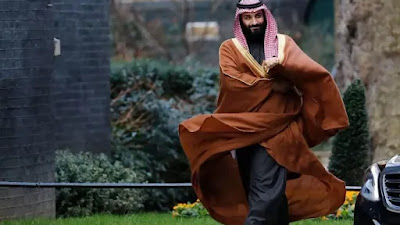




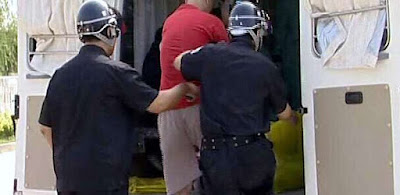
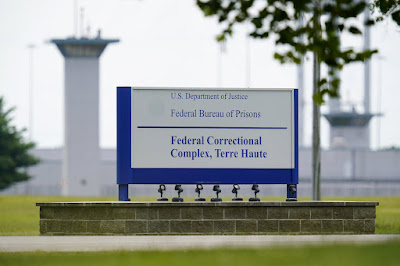
.jpg)
